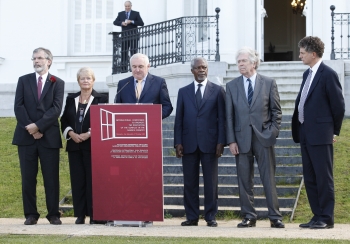SPAIN: ETA Announces End to Europe's Last Armed Conflict

'This is probably the most important day ever for us, the Basque people, since the death of (dictator) Franco in 1975,' journalist and historian Urko Apaolaza told IPS.
On Thursday evening, the armed Basque separatist organisation ETA announced a 'definitive cessation of (its) armed activity' in a statement sent to the Basque Country newspapers GARA and Berria, as well as the New York Times and the BBC.
The local media had already mentioned the possibility that ETA would release a communiqué to that end.
On Monday, at an international peace conference in San Sebastián, in Spain's northern Basque province, international personalities who have helped broker solutions to conflicts in places like South Africa and Northern Ireland urged ETA to lay down its arms.
In the conference, local politicians were joined by former U.N. secretary general Kofi Annan, former prime ministers Bertie Ahern and Gro Harlem Brundtland of Ireland and Norway, respectively, the head of Ireland's Sinn Fein party Gerry Adams, and former French interior and defence minister Pierre Joxe.
In a five-point statement, the international mediators called on ETA 'to make a public declaration of the definitive cessation of all armed action,' and urged Spain and France to agree to talks if it did so.
The declaration also talked about reconciliation and about the need to recognise and compensate ETA's victims. Lastly, the delegation led by Annan offered to monitor the hoped-for peace process. Two days later, former British prime minister Tony Blair and former U.S. president Jimmy Carter sent out statements supporting the declaration.
Half a century of conflict
Everyone hopes the statement issued Thursday by ETA will put an end to what has been called Europe's 'last armed conflict'
Although the debate on independence for the Basque people, who live on both sides of the Spanish and French border, began in the 19th century, it was not until 1959 that the armed organisation ETA — an acronym in the Basque language for 'Basque fatherland and freedom' — was founded to wage an armed campaign against the dictatorship of General Francisco Franco (1939-1975).
After that, the Basque conflict took on a political and social dimension in which nationalist political parties on both sides, as well as social movements and other groups, found themselves bogged down.
Half a century later, the number of victims is put at over 800, mainly members of the security forces and politicians, but also Basque activists executed by paramilitary groups in the 1980s.
In addition, human rights organisations like the London-based Amnesty International have echoed reports of the torture of thousands of Basque prisoners in Spanish jails. Many of these prisoners have later been released, after no evidence was found to link them to the armed group.
These same alleged ties to the armed struggle kept the pro-independence Basque left from participating in political life for over 10 years.
In addition, freedom of expression has suffered the impact of the conflict. The most visible consequence was the shutdown of two local newspapers — including the only one that was published entirely in the Basque language — as well as legal charges against several of the papers' employees.
Although France has more than 150 Basque prisoners in its jails, and despite the fact that most of the arrests of members of ETA last year took place in that country, Paris has always considered the 'Basque issue' a Spanish question.
In a brief communiqué issued Thursday, the French foreign ministry expressed scepticism with respect to ETA's announcement.
But to the south of the Pyrenees mountains, the climate could not be more different. On the public TV stations, representatives of nearly every political party and social leaders of all stripes welcomed ETA's statement.
Mariano Rajoy, leader of the centre-right People's Party — the main opposition force — said it was 'great news that would only be completed by the irreversible disbanding' of the group.
The Basque socialist party (PSE) — an affiliate of the governing socialist party (PSOE) — called it 'a historic moment' and a 'bid for coexistence.'
And the Republican Left of Catalonia (ERC), a pro-independence leftist coalition in the northeastern province of that name, said it hoped that 'Basques and Catalonians would be able to decide on their independence.'
'The armed struggle has been, until today, Madrid's main excuse for not addressing political issues. Now the time has come to do politics, with a capital 'P',' Basque writer and political analyst Urtzi Urrutikoetxea told IPS.
Like Urrutikoetxea, many analysts say the weakening of the armed group was inversely proportional to the growing support earned by the Basque left in recent years.
The best gauge of that was the result of the municipal elections in June, in which the Basque pro-independence coalition Bildu became the second strongest political force in the Basque Country, after the Basque nationalist party (PNV), and ahead of the PSE and the PP.
'It will be up to the government and the parliament to emerge from the upcoming elections to lead the peace process,' said Prime Minister José Luis Rodríguez Zapatero.
The polls point to a landslide victory for the PP, which may win a parliamentary majority in the Nov. 20 elections, while many analysts have begun to predict that in the Basque Country, the pro-independence left could garner the largest number of votes.
Everything indicates that the road to peace for the Basque people begins today, Oct. 20 — but no one says it will be easy.
© Inter Press Service (2011) — All Rights ReservedOriginal source: Inter Press Service
 Global Issues
Global Issues